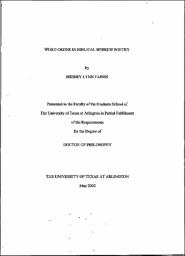
ATTENTION: The works hosted here are being migrated to a new repository that will consolidate resources, improve discoverability, and better show UTA's research impact on the global community. We will update authors as the migration progresses. Please see MavMatrix for more information.
Show simple item record
| dc.contributor.author | Fariss, Sherry Lynn | |
| dc.date.accessioned | 2020-10-09T19:05:49Z | |
| dc.date.available | 2020-10-09T19:05:49Z | |
| dc.date.issued | 2003-05 | |
| dc.identifier.uri | http://hdl.handle.net/10106/29494 | |
| dc.description.abstract | Syntacticians generally focus on prose texts of a language when studying word order rather than examining poetry. The general consensus is that the stylization of poetry exercises too great an influence on the text to allow for regular word order. In their study of pragmatics, particularly in obsolete languages, Herring (2000) and Hock (2000) demonstrate that even in poetry syntactic patterns can be seen in different genres or text types. Herring's contention in Old Tamil poetry is that the more poetic the genre, the more word order variation can be expected. By the same token, the more informational the genre, the more likely the traditional word order is to remain stable. This dissertation examines the poetry of Biblical Hebrew, a text language, to determine whether the poeticality of a text type, similar to Herring's genre examination, affects word order variation. Furthermore, because of the nature of the narrative text type to affect the maintenance of the traditional VSO word order in Biblical Hebrew, this dissertation also examines various text types through the grid of transitivity to discover what affects word order choice and variation. Thirty sample texts of Biblical Hebrew poetry of five text types were chosen and analyzed clause by clause. The initial element of each clause (whether verb, subject, object, or peripheral material) was noted in particular as well as the combinations throughout the clause of two of these elements (e.g. OS, OV, SO, SV, etc.). It was discovered, through an examination of these sample texts, that poeticality has little effect on word order variation in Biblical Hebrew, but that transitivity appears to answer the questions of word order variation by text type. The conclusion drawn from the data is that the more transitive the text type, the more likely it is to maintain the basic verb-initial order; and the less transitive the text type, the more likely it is to vary. | en_US |
| dc.language.iso | en_US | en_US |
| dc.publisher | University of Texas at Arlington | en_US |
| dc.subject | Language | en_US |
| dc.subject | Literature and linguistics | en_US |
| dc.subject | Biblical Hebrew | en_US |
| dc.subject | Informationality | en_US |
| dc.subject | Poetry | en_US |
| dc.subject | Transitivity | en_US |
| dc.subject | Word order | en_US |
| dc.title | WORD ORDER IN BIBLICAL HEBREW POETRY | en_US |
| dc.type | Dissertation | en_US |
| thesis.degree.department | Linguistics | |
| thesis.degree.name | Doctor of Philosophy in Linguistics | |
Files in this item
- Name:
- Word Order in Biblical Hebrew ...
- Size:
- 22.81Mb
- Format:
- PDF
- Description:
- PDF
This item appears in the following Collection(s)
Show simple item record


